-
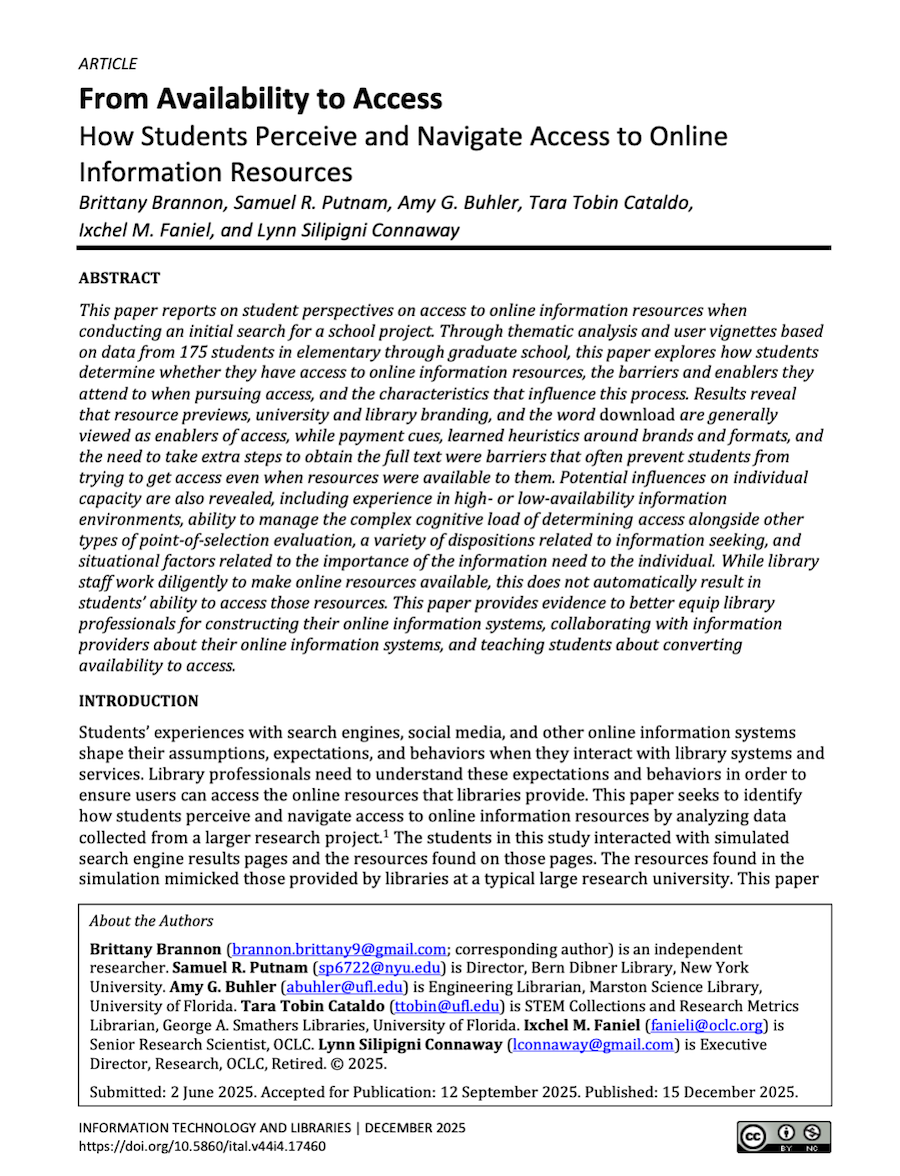
From Availability to Access: How Students Perceive and Navigate Access to Online Information Resources
15 December 2025
Brittany Brannon, Samuel R. Putnam, Amy G. Buhler, Tara Tobin Cataldo, Ixchel M. Faniel, Lynn Silipigni Connaway
Provides insight into how library leaders and staff expect changing library experiences to create more meaningful engagement and positive impacts in the next five to ten years.
-
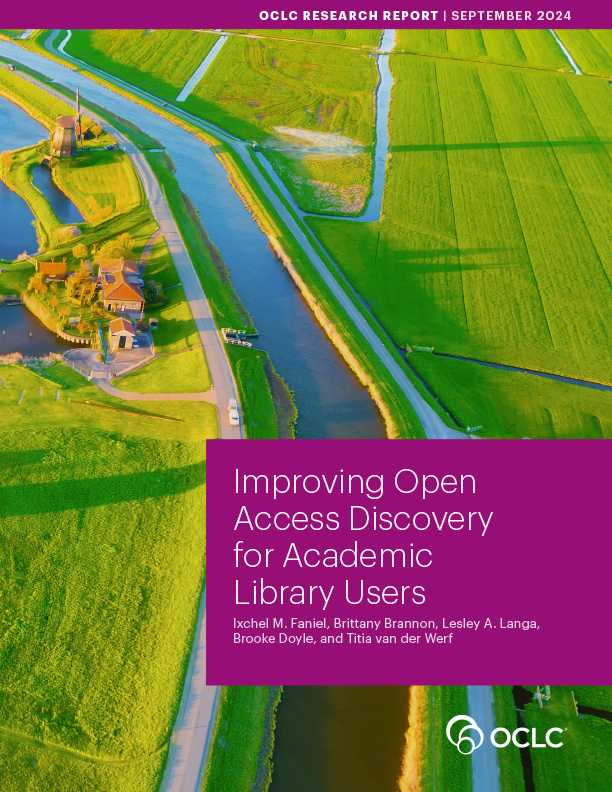
Improving Open Access Discovery for Academic Library Users
25 September 2024
Ixchel M. Faniel, Brittany Brannon, Lesley A. Langa, Brooke Doyle, Titia van der Werf
Examines efforts made by academic library staff at seven institutions in the Netherlands to make scholarly, peer-reviewed open access publications more discoverable by users.
-
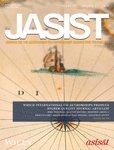
An Empirical Examination of Data Reuser Trust in a Digital Repository
24 June 2024
Elizabeth Yakel, Ixchel M. Faniel, Lionel P. Robert Jr
Proposes and tests a model of trust in a data repository and the influence that trust has on users’ decision-making.
-
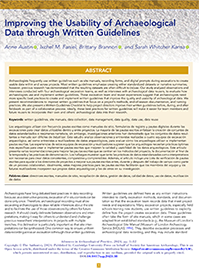
Improving the Usability of Archaeological Data through Written Guidelines
25 January 2024
Anne Austin, Ixchel M. Faniel, Brittany Brannon, and Sarah Whitcher Kansa
Our study analyzed observations and interviews conducted with four archaeological excavation teams, as well as interviews with archaeological data reusers, to evaluate how archaeologists use and implement written guidelines.
-
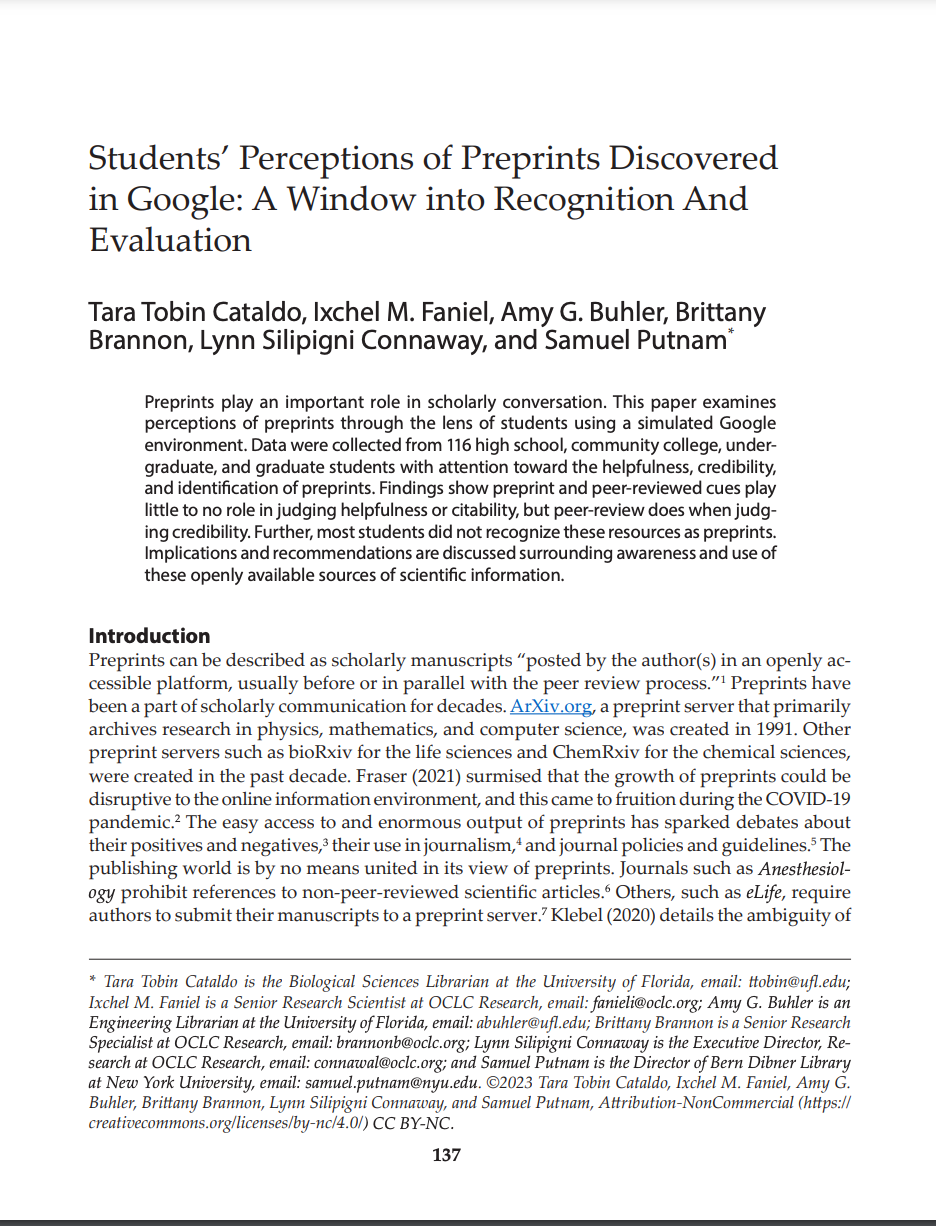
Students’ Perceptions of Preprints Discovered in Google: A Window into Recognition And Evaluation
1 January 2023
Tara Tobin Cataldo, Ixchel M. Faniel, Amy G. Buhler, Brittany Brannon, Lynn Silipigni Connaway, Samuel Putnam
Preprints play an important role in scholarly conversation. This paper examines perceptions of preprints through the lens of students using a simulated Google environment.
-
How real is real enough? Participant feedback on a behavioral simulation used for information-seeking behavior research
12 January 2022
This paper assesses the realism of a behavioral simulation used to study the evaluation behavior of 175 students from fourth grade through graduate school. We assess realism through the examination of targeted participant feedback about what would have made the simulated environment and tasks more realistic to these participants. Based on this feedback, we reflect on decisions made in designing the simulation and offer recommendations for future studies interested in incorporating behavioral simulation in their research design.
-
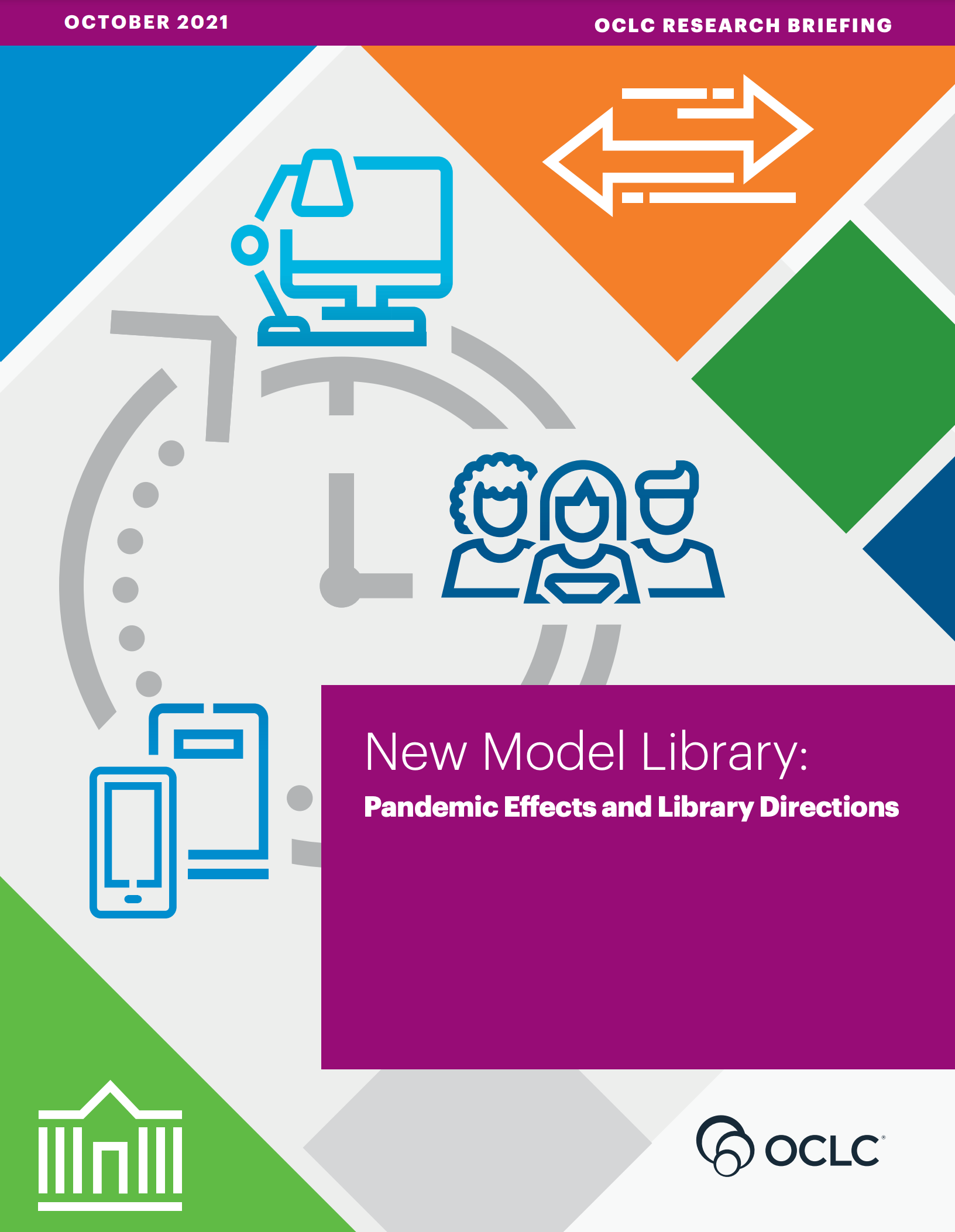
New Model Library: Pandemic Effects and Library Directions
28 October 2021
Lynn Silipigni Connaway, Ixchel M. Faniel, Brittany Brannon, Joanne Cantrell, Christopher Cyr, Brooke Doyle, Peggy Gallagher, Kem Lang, Brian Lavoie, Janet Mason, and Titia van der Werf
The COVID-19 pandemic impacted libraries of all types around the world, requiring library leaders to respond to rapidly shifting community and institutional needs. This briefing shares how leaders adapted during the pandemic and what they envision moving forward to help libraries plan strategically.
-
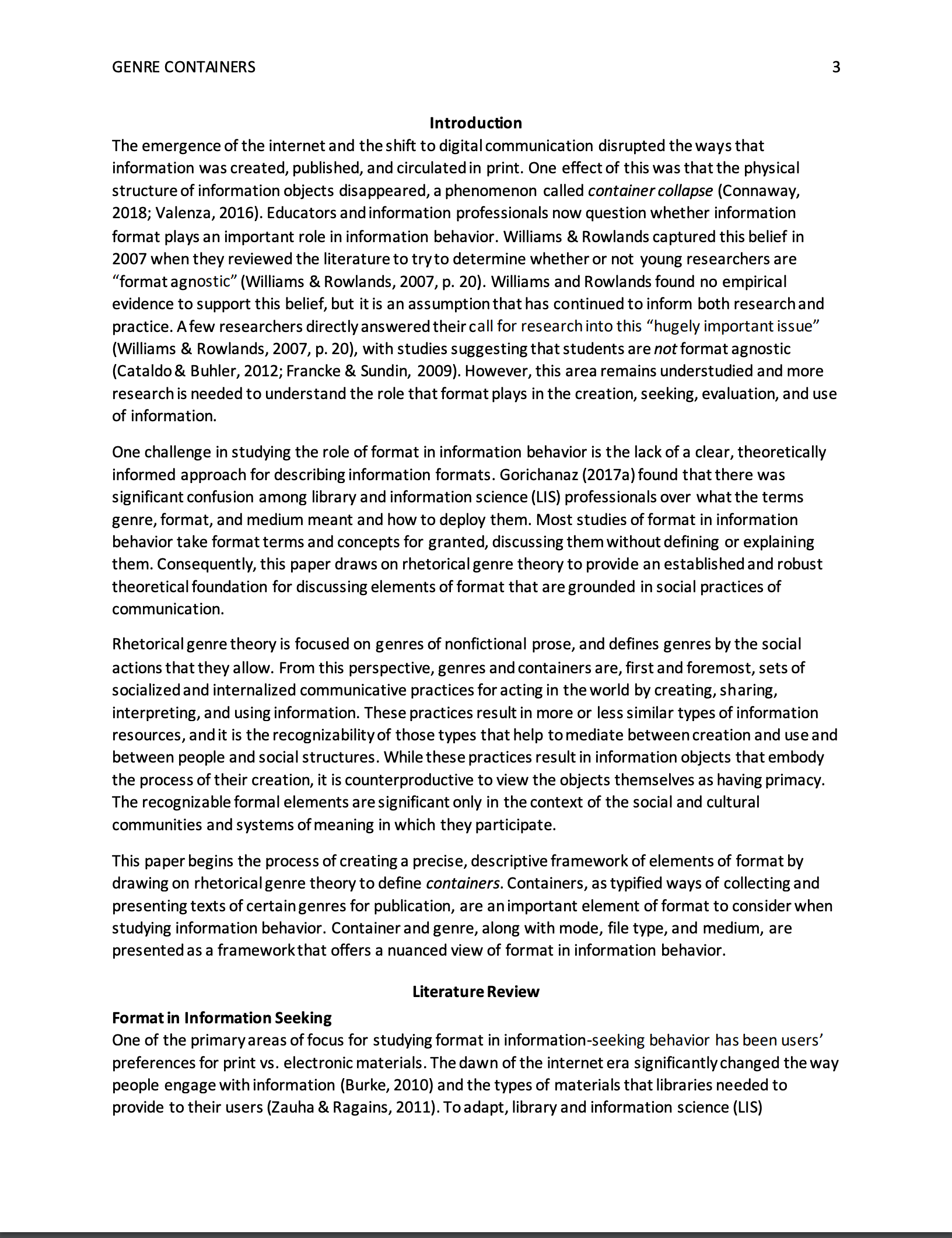
Genre Containers: Building a Theoretical Framework for Studying Formats in Information Behavior
26 October 2021
Brittany Brannon, Amy G. Buhler, Tara Tobin Cataldo, Ixchel M. Faniel, Lynn Silipigni Connaway, Joyce Kasman Valenza, Christopher Cyr
Prior studies have shown high-level differences in people's perception and use of various information formats. However, the lack of a coherent and theoretically informed framework of elements of format has inhibited a nuanced understanding of the role that formats play in information behavior. This paper draws on theories from the field of rhetoric and composition to ground the study of information format in a social constructivist perspective that foregrounds action in context.
-
Using collective curation to pay data forward in the life cycle
11 June 2021
Ixchel M. Faniel
Drawing from a study of archaeological excavation teams, four collective curation opportunities are proposed to identify and resolve differences in data and documentation practices that arise in team-based research. To create more integrated, well-documented data, the opportunities attend to integrating people rather than technology. The actions people take as data move through the life cycle become the focal point of change.
-
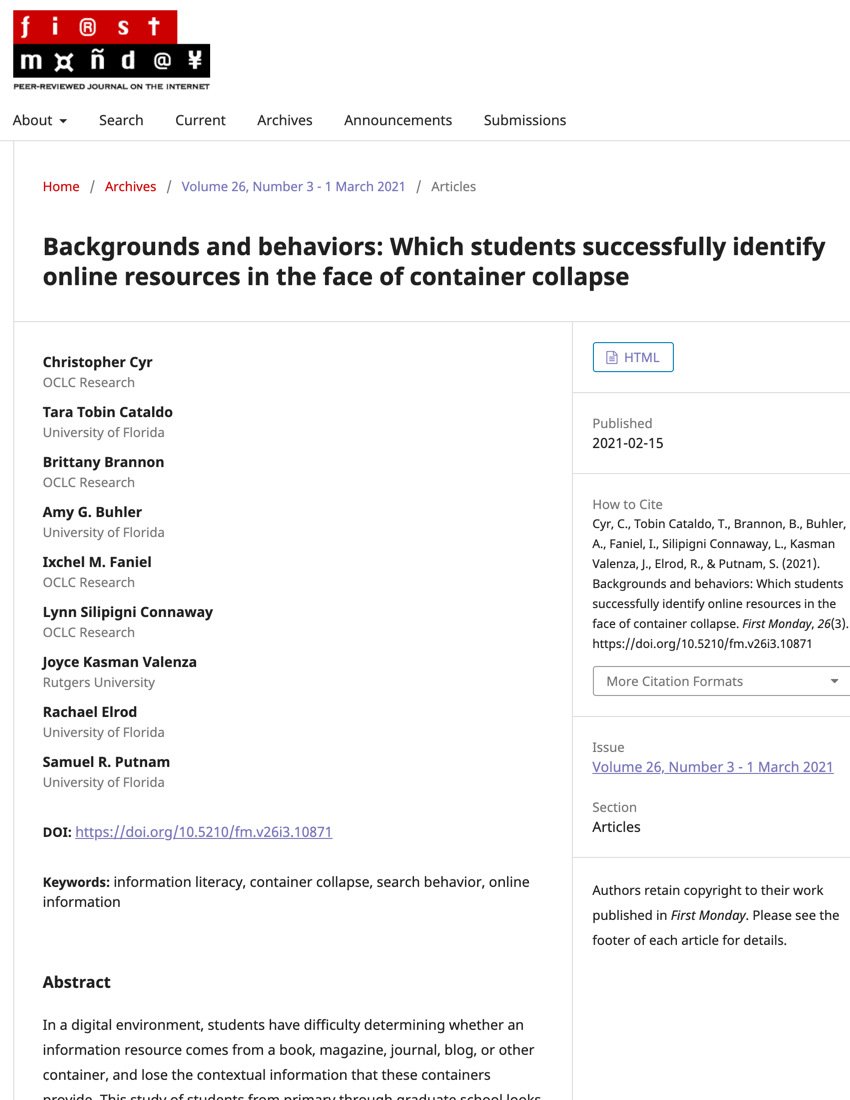
Backgrounds and behaviors: Which students successfully identify online resources in the face of container collapse
15 February 2021
Christopher Cyr, Tara Tobin, Brittany Brannon, Amy G. Buhler, Ixchel M. Faniel, Lynn Silipigni Connaway, Joyce Kasman Valenza, Rachael Elrod, Samuel R. Putnam
This study of students from primary through graduate school looks at their ability to identify the containers of information resources, and how this ability is affected by their demographic traits, the resource features they attended to, and their behaviors during a task-based simulation.
Publications
Showing 1 - 10 of 33

